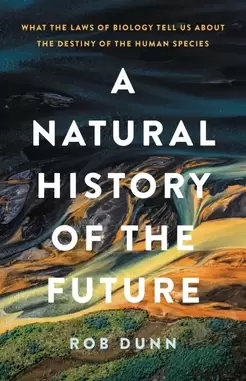 We recommend for your reading a thought-provoking new book by NC State University professor of applied ecology and entomologist Rob Dunn – “A Natural History of the Future: What the Laws of Biology Tell Us About the Destiny of the Human Species” (published in late 2021). This is the seventh book authored by Dunn, whose books and eloquent authorship are being compared to that of E.O. Wilson. Rather than asking whether nature will survive us humans, Dunn suggests it is better to ask whether we will survive nature. Despite our efforts to control nature, life has its own rules and no amount of human tampering can rewrite those basic rules. Dunn explains fundamental laws of ecology, evolution, and biogeography and shows that life will be changed but not repressed by our human activities. Instead, Dunn shows why it is our own human future and destiny that hang in the balance. Some excerpts from Rob Dunn’s conclusions in “A Natural History of the Future”: “In the near future, parts of Earth will be much more pleasant for extremophilic life-forms but much less for humans. We can find ways to survive such change. Just not forever. Eventually, we will go extinct. All species do. This reality has been called the first law of paleontology. The average longevity of animal species appears to be around two million years, at least for taxonomic groups for which the phenomenon has been well studied. If we consider just our species, Homo sapiens, that means we may still have some time. Homo sapiens evolved roughly two hundred thousand years ago. We are still a young species. This suggests that if we last an average amount of time, our road is still long. On the other hand, it is the youngest species that are most at risk of extinction. Like puppies, big-eyed and not yet wise, young species are prone to fatal mistakes.” continued . . . “It is tempting (for humans to imagine) . . . the sort of hubris to which our species has long been susceptible, the hubris of believing ourselves to be exempt from the laws of life. Our best bet for extending our stay on this planet is a humbler one: to pay attention to the laws of life and work with them rather than against them. We need to conserve and curate the islands of habitat on Earth in ways that promote the evolution of species that are benign or even beneficial to us. We need to provide corridors through which species can home in on the habitats in which they will be able to survive in future climates. We need to carefully manage the ecosystems around us so as to keep the parasites and pests of our bodies and crops at bay (to escape one more time). We need to reduce greenhouse gas emissions as fast as possible so as to leave as much of the Earth as possible with conditions that are still within the limits of the human niche. And we need to find ways to save the species and ecosystems on which we depend or might someday depend. And as we do all of this, we need to remember that we are one species among many, a species that is no more or less special than the shimmering hairy protist that lives inside the termite gut, the rhinoceros botfly,or a ground beetle that lives its entire life among the leaves of a single individual of a single species of tree.”
“We once assumed the sun circled the Earth. Now we know that Earth circles the sun, which happens to be a rather mundane star, one among billions. We once assumed the story of life was about us. Now we know that the story of life is mostly about microbes. We are a clumsy giant late to the drama, a character in life’s play that doesn’t make it to the curtain call. We should, of course, try to prolong the time our species has on Earth, just as each of us tries to prolong our own life. Yet however much we extend what we have, it is good to be aware it is finite. We will end. When we end, the geological age defined by our consequences, the Anthropocene, will end. A new age will begin. We won’t see it, and yet we can posit some of its features because, even after we are gone, species will continue to obey the laws of life.”
0 Comments
Leave a Reply. |
When we see land as a community to which we belong, we may begin to use it with love and respect.... Conservation, viewed in its entirety, is the slow and laborious unfolding of a new relationship between people and land." There is in fact no distinction between the fate of the land and the fate of the people. When one is abused, the other suffers. From the PresidentSCP President Chuck Roe looked at land conservation along the route of John Muir's "Southern Trek." About ViewpointThis blog offers views of our Board and partners. We invite your viewpoint on the following questions: Archives
April 2024
Categories
All
|

 RSS Feed
RSS Feed